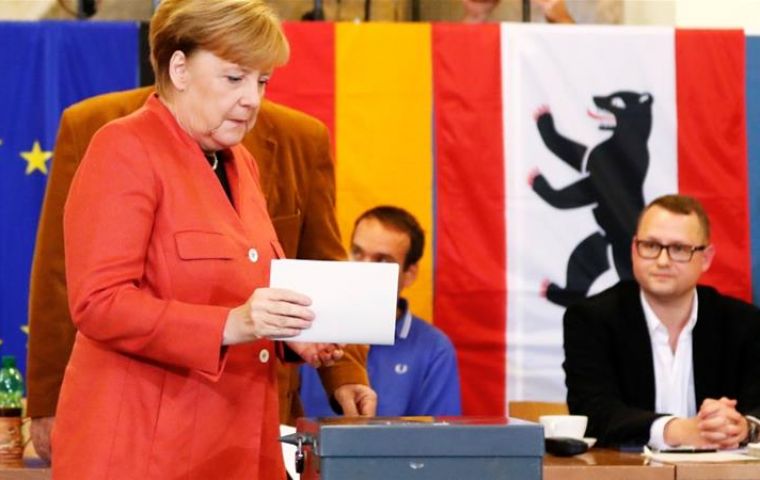MercoPress. South Atlantic News Agency
Germany's (neo-fascist) protest vote fuelled by extended income gap
 Looking closely, the AfD’s support was strongest in the same parts of the country that voted strongly for the Nazis in the 1933 election that brought Hitler to power.
Looking closely, the AfD’s support was strongest in the same parts of the country that voted strongly for the Nazis in the 1933 election that brought Hitler to power.  AfD was founded by an economics professor who wanted Germany to leave the Euro, but in four years it attracted anti-Muslim, anti-immigrant ultra-nationalists
AfD was founded by an economics professor who wanted Germany to leave the Euro, but in four years it attracted anti-Muslim, anti-immigrant ultra-nationalists  Alice Weidel, the AfD’s co-leader, has described Merkel’s government as “pigs” who merely serve as “marionettes of the victorious powers of the WW2”
Alice Weidel, the AfD’s co-leader, has described Merkel’s government as “pigs” who merely serve as “marionettes of the victorious powers of the WW2”  The party’s co-leader, Alexander Gauland, said in an election speech: “We have the right to be proud of the achievements of the German soldiers in two world wars.”
The party’s co-leader, Alexander Gauland, said in an election speech: “We have the right to be proud of the achievements of the German soldiers in two world wars.” By Gwynne Dyer - Angela Merkel’s slogan in her campaign for a fourth term as Chancellor was terminally bland and smug – “For a Germany in which we live well and love living” – but it did the job, sort of. Her Christian Democratic Union (CDU) is back as the largest party, so Merkel gets to form the next coalition government. But the neo-fascists are now in the Bundestag (parliament) too, for the first time since the collapse of Nazi Germany.
It’s not Merkel’s fault, exactly, but the numbers tell the tale. The CDU had its worst result ever, down from 40% of the vote at the last election to only 33% this time. And it looks like the 7 percentage points of the vote that the CDU lost went straight to the Alternative for Germany (AfD), the neo-fascist party, whose support was up from just under 5% last time to 12.6% this time.
That makes the AfD the third biggest party in the Bundestag. All the other parties have sworn to have nothing to do with it, so Merkel’s party will have to seek its coalition partners elsewhere. It will take at least a month to make the coalition deal, which will probably link the CDU with the business-friendly Free Democrats and the Greens, but that is not the big story. The rise of the hard right is.
‘Rise’ is a relative term, of course: only one German in eight actually voted for the AfD. But that is still shocking in a country that thought it had permanently excised all that old Nazi stuff from its politics. And if you look more closely, the AfD’s support was strongest in the same parts of the country that voted strongly for the Nazis in the 1933 election that brought Hitler to power.
The AfD was founded by an economics professor, who just wanted Germany to leave the Euro currency, but in the past four years it has been taken over anti-Muslim, anti-immigrant ultra-nationalists, and they do sound a little bit like You-Know-Who at times.
Alice Weidel, the AfD’s co-leader, has described Merkel’s government as “pigs” who merely serve as “marionettes of the victorious powers of the Second World War, whose task it is to keep down the German people.” And the party’s other co-leader, Alexander Gauland, said in an election speech last week: “We have the right to be proud of the achievements of the German soldiers in two world wars.”
That sort of comment might be interesting to debate in a university seminar on German history, but 72 years after Hitler’s death it is still too soon to say out loud in a Europe that was ravaged by German armies in the Second World War. Gauland, Weidel and their AfD colleagues are playing with fire and they are well aware of it.
The truly alarming thing, however, is not the occasional echo of the Nazis in AfD rhetoric. It is the fact that Germany is conforming to a general trend towards the authoritarian, ultra-nationalist right in Western politics.
Each country does it in its own historical style. The pro-Brexit campaign in the United Kingdom last year was actually led by isolationist “Little Englanders”. Their implausible promise of a glorious free-trading future for the UK outside the European Union was just a necessary nod in the direction of economic rationality – but the Brexiteers won because enough people wanted to believe them.
Similarly, Donald Trump fits comfortably into the American tradition: he is channeling American demagogues of the 1930 like Huey Long and Father Coughlin. The economic situation of American workers and the lower middle class today is close enough to that of the 1930s that they responded to his mixture of nationalism, dog-whistle racism and anti-big-business rhetoric by voting him into the presidency.
In France, Marine Le Pen appealed to nationalism, anti-immigrant sentiment and the resentment of the long-term unemployed to win almost 34% of the vote in last May’s presidential election. She lost, but the more important fact is that one-third of French voters backed the neo-fascist candidate. And now, in German, the AfD.
The common thread that runs through all these events, beyond the racism, nationalism and xenophobia, is economic distress. The economies may be doing well, but a large proportion of the people are not. The gap between the rich and the rest was tolerated when everybody’s income was rising, but that has not been true for thirty years now, and patience among the “losers” has run out.
This is still early days, but the direction of the drift in Western politics is clear, and it is deeply undesirable. The only thing that will stop it is decisive action to narrow the income gap again, but that is very hard to do in the face of the currently dominant economic doctrine.




Top Comments
Disclaimer & comment rules-

-

-

Read all commentsIf you don't think there is much point to NATO, ask the Poles , Latvians, Lithuanians, Norwegians,Czechs, Slovakians, Romanians and Bulgarians. They have seen what has happened in Georgia and the Ukraine. The Ukraine gave up its nuclear arsenal on assurances from Russia that it would respect their national boundaries. We saw what that was worth !
Sep 29th, 2017 - 11:25 am +2The Germans don't like spending on defence. They all but scuttled the Eurofighter by cancelling numbers required and delaying deliveries adding too the unit costs.
Actually I thought we were back into a cold war ! Putin is ex KGB and adept at seizing any advantage to make Russia more politically powerful. His agents have managed to kill one of his Russian critics in Britain. Cyber attacks are a daily occurrence against western companies and institutions. A friend to Syria and Iran. Hardly a friendly neighbour.
Sep 29th, 2017 - 05:36 pm +2I don't know how the 2% figure was arrived at, but it seems that a corresponding figure allocated from the countries budget would seem fair.
Our defence chiefs are opposed to a European Defence Force. NATO works just fine for us.
We are leaving the EU because we do not want anything to do with an United States of Europe. A European defence force would require political union so it has to be a non-starter for us.
With a common procurement policy it would be nothing but trouble. Who would get the orders for ships, tanks and aircraft. I am sure the French would be in there first.
A common language would be needed. The French would insist that it would have to be their language. They still have a hankering for “La Gloire”
No, NATO has served us well during my lifetime and I see no reason to change it.
Interesting article. It's fairly obvious that the big immediate cause for the increase in support for the AfD was Merkel's decision to let in over 1m refugees. But the map of asylum seakers in Germany does not match up at all well with the map of AfD votes, so there must be something else going on.
Sep 27th, 2017 - 10:53 am +1AfD voters are concentrated in the old East Germany, which is still the poorest part, but they are also relatively popular in Bavaria and Baden-Wurttemberg, which are two of the richest areas. Also poor areas on the western border of Germany did not vote for the AfD. So it's not just about money either.
AfD vote appears to be somewhat anti-correlated to the SPD, so could the distribution be more linked to social conservatism than anything else?
Commenting for this story is now closed.
If you have a Facebook account, become a fan and comment on our Facebook Page!